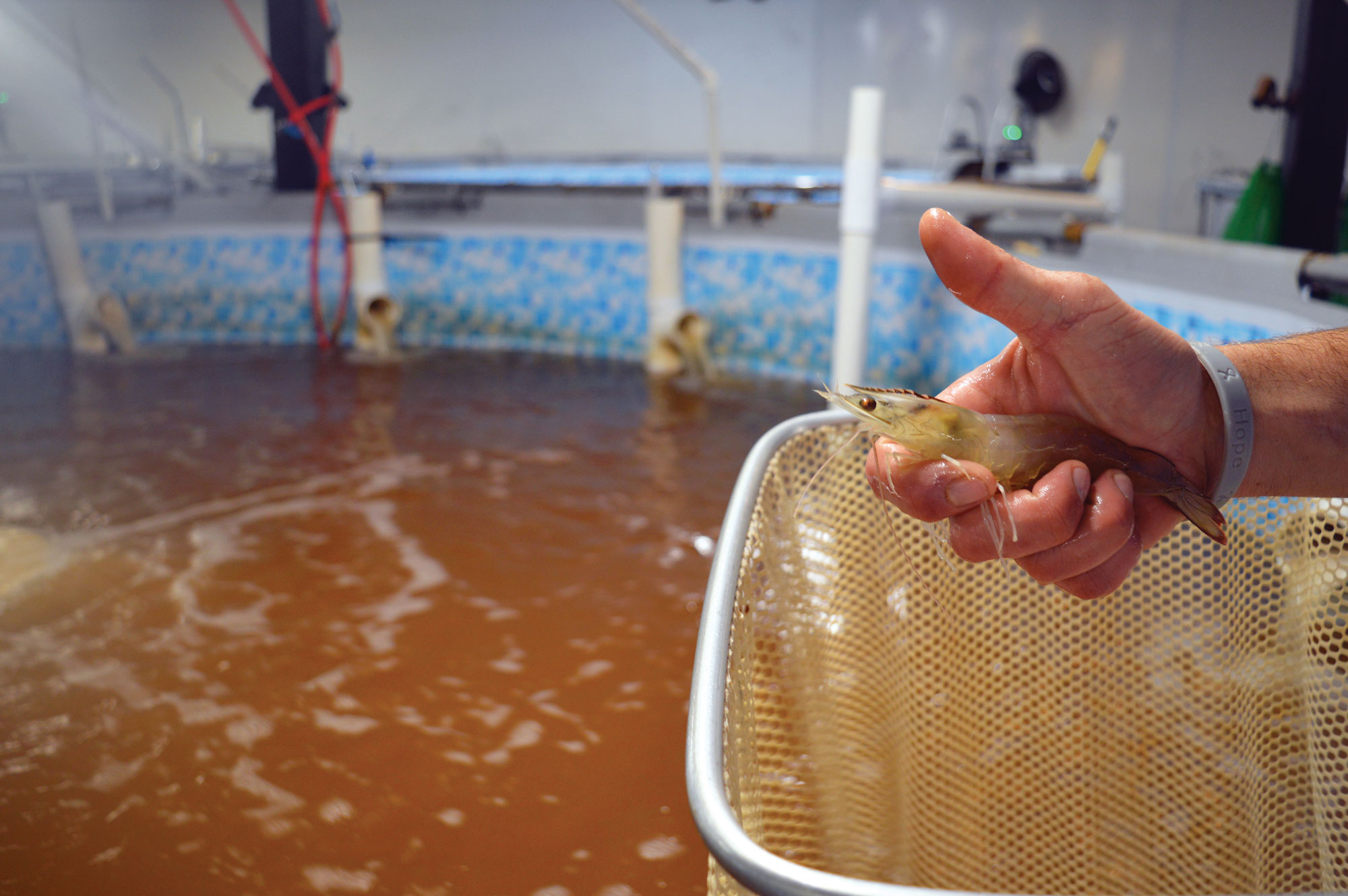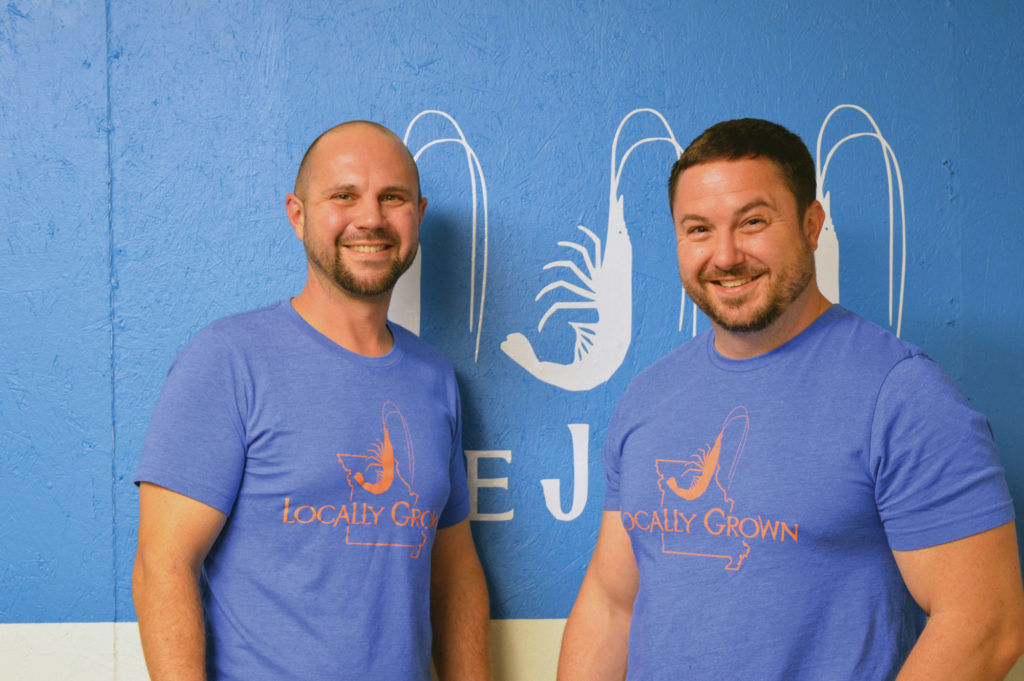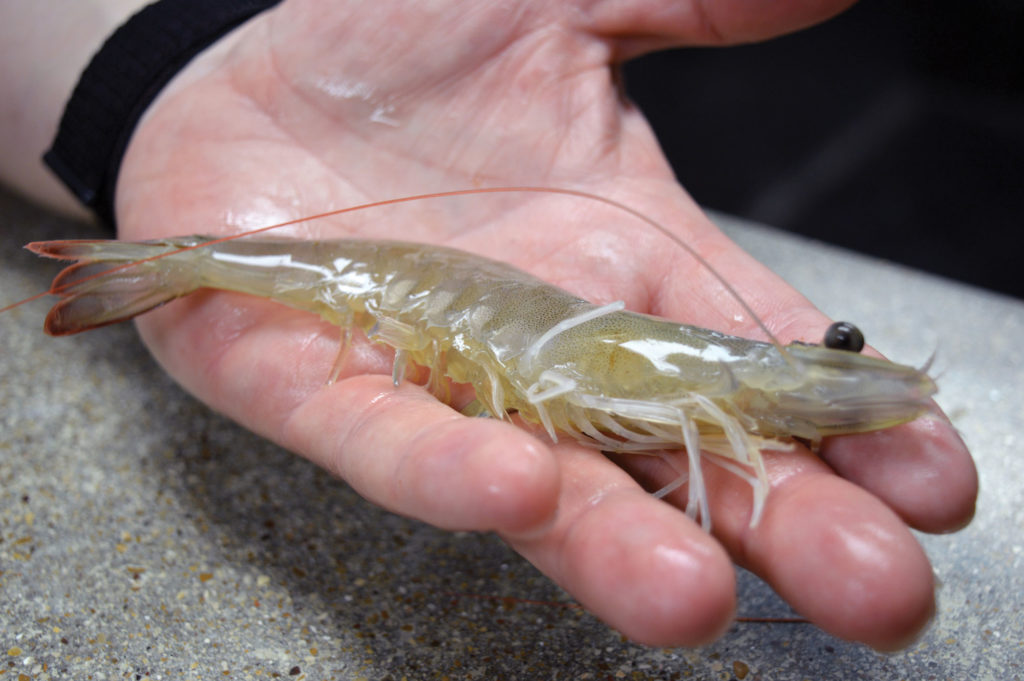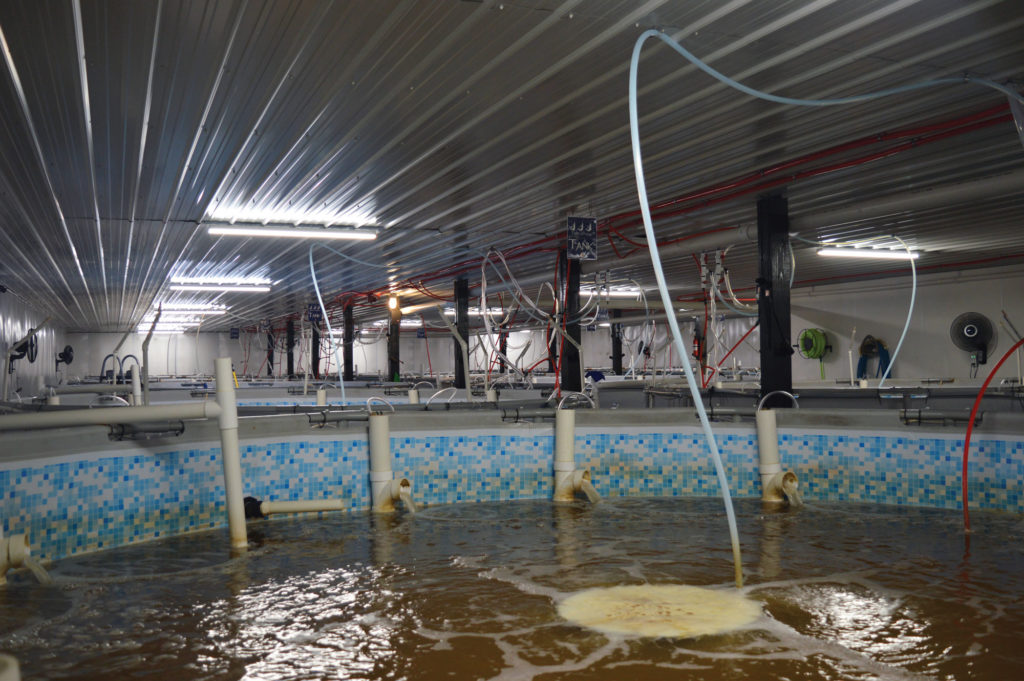
Shrimply the Best
December 15, 2019
Written By Nancy Demaree
Brothers Embrace Shrimp, Aquaculture to Differentiate Their Midwest Farm
Pacific white leg shrimp suddenly find themselves plunged into darkness, they panic. The translucent crustaceans start jumping in their tanks, rumbling like thunder; some even launch themselves out onto the concrete floor of the tank room in a desperate attempt to find light.
But all is not lost: After 20 seconds of darkness, the nightlight kicks on, and Jeff and James Howell, flashlights in hand, dutifully throw any jumpers back into their tanks.

The Howell brothers have been raising Pacific white leg shrimp for about two years now. Triple J Farms, near Foristell, Mo., about an hour outside of St. Louis, is one of only three shrimp farms in the state. Jeff, who’s sturdy with an open face and an easy manner, and James, taller and quieter, come from “an old farm family” in Defiance, where the Howells still farm a couple thousand acres of soybeans. (The third J, eldest brother Jason, works as a civil engineer in Kirkwood, Mo.)
Their father, Dave, came across an article in Corn and Soybean Digest on how Cargill, the Minnesota-based agricultural company, was trying to make shrimp feed out of soybeans.
“We’re just dumb hicks from Missouri,” Jeff jokes. “That got us to thinking: ‘Why do you need shrimp feed? Don’t you just catch those things out in the ocean?’ So we started doing research, and what we found out is, no. Ninety-two percent of all shrimp consumed in the United States is imported, (mostly) from Asian shrimp farms. Of that, only 2 percent is inspected by the FDA, and about 60 percent of that is rejected for the use of tetracyclines, souped-up antibiotics and filth. We’re thinking there is a better way you can do that.”
Jeff and James first visited RDM Shrimp, a shrimp farm in Fowler, Ind., near Purdue University, to learn the ropes three years ago. They launched Triple J Farms in November 2016 with eight tanks, which look like small above-ground pools, and 40-day-old shrimp.
“It was a lot of trial and error,” Jeff says, shaking his head as he recalls those early days. “Our first go-arounds on our tanks, we were having like 50 and 60 percent (survival rates). Just like anything else, we got more knowledgeable. And if that’s your profit you lost in the tank, you’ll start doing it right. So it took a little while, but we’re getting to a point where we have a high 80s, low 90s survivability rate.”
The thing that really sets Triple J apart—besides the fresh shrimp in landlocked Missouri, of course—is how clean it is. At first, guests on tours are often alarmed by the brown-looking water, which gets its color from the food-grade shrimp feed and the heterotrophic bacteria.
The bacteria, which is the same kind humans have in their guts, will consume the waste put out by the shrimp and turn it into nitrites and then nitrates, and eventually carbon dioxide—meaning the Howells don’t have to filter any waste out of the tanks. They also don’t use any antibiotics, hormones or chemicals; instead, the shrimp live alongside the bacteria in their own little environment.
Jeff performs 11 tests on every one of their 14 tanks each day to ensure the shrimp are getting what they need. The tests check temperature, dissolved oxygen, salinity, alkalinity, pH, nitrites, nitrates, ammonia, carbon dioxide, heavy solids and mortality rates.
“I’m no chemist or scientist,” Jeff says, though he has a lab full of testing equipment and chemical tests between the sales counter and the tank room. The shrimp—around 50,000 when fully stocked—are fed three times a day and sleep at night, just like humans, which is when the Howells must watch for jumpers. Generally, James, who lives in a farmhouse near the shrimp, will feed them dinner and breakfast, and Jeff will come in and feed them lunch and do his 11 tests.
The final test is mortality. Each tank is stocked with about 3,500 shrimp, and they’ll lose a few every day. Even those, though, are frozen and sold as catfish bait.
“That’s our lemonade out of lemons,” Jeff says.
Triple J has already expanded since 2016, adding six tanks to the original eight and, more recently, installing two nurseries. These rectangular tanks hold 15,000 baby shrimp each. At 10 days old, the shrimp are the size of an eyelash.
“These guys are like human babies—they’re really strong,” Jeff says, fishing out some with a small net. “They’ll bounce back from a lot of stuff.”
The baby shrimp came from a hatchery in St. James City, Fla., just over a week before. James marvels at their size.
“They’re way bigger than they were a week ago,” he says, as a tiny, wet sliver jumps around in the palm of Jeff’s hand. After 27 days in the nursery, the baby shrimp will be about a gram in size and ready for a production tank, where they’ll grow for three more months until they’re ready for harvest.
Triple J is open Thursdays, Fridays and Saturdays, and about 90 percent of their business comes from customers who drive down a gravel road, through soybean fields, past James’ farmhouse and up to the shrimp farm. The tanks are weighed each Wednesday, so the Howells know, more or less, how many and what size shrimp they have.
If someone wants a pound of 20/30 count shrimp, for example, Jeff will ask James to hit tank 9. James scoops a large net into the tank—at this point he can pretty much eyeball how many he’ll need—and pulls out the translucent shrimp, who flop and jump around like fish. They have feelers several inches long and round, black eyes that look like they might burst if touched.
Jeff packs them into a zip-top plastic bag, tucking in errant feelers, and seals the bag before nestling it on ice in a small blue Triple J Farms tote. The brothers are quick to offer cooking suggestions, though the simplest is arguably the best: just boil them for three minutes and enjoy. The shrimp quickly take on a pleasant pink color and curl into the familiar shape.
The Howells even record mini cooking videos and post them to the Triple J Facebook page. The videos show them cooking up skewered shrimp with barbecue-glazed smoked sausage, bacon-wrapped shrimp with a maple-bourbon glaze and a shrimp scampi tray appetizer with butter and lots of garlic. The two swear they don’t get sick of eating shrimp.
“I eat it once or twice a week,” James says.
“My wife wishes we ate it more,” adds Jeff, “but we have two little girls who don’t like shrimp.”
Their friend Chris has stopped in to visit, and he admits it’s great to be friends with the Howells. “I don’t think I could get sick of (shrimp),” he says. “There’s too many dishes to use it for. You can’t get better shrimp than this unless you know somebody on the coast, or you’re going to the coast. These are clean and natural and awesome.”
Triple J is just starting out with the two nurseries, so James and Jeff hope that will continue to be a success and they can have a steady supply of shrimp. The next step would be to have their own hatchery, which would require adding a separate building. This spring, they’re supplying shrimp to the highly anticipated Elmwood, a new restaurant opening in the St. Louis suburb of Maplewood.
“When you’re looking to start up a business, you need something that’s unique, something where there are high barriers to entry, and something that people are gonna talk about,” Jeff says. “A shrimp farm in Missouri kinda hits all three.”



